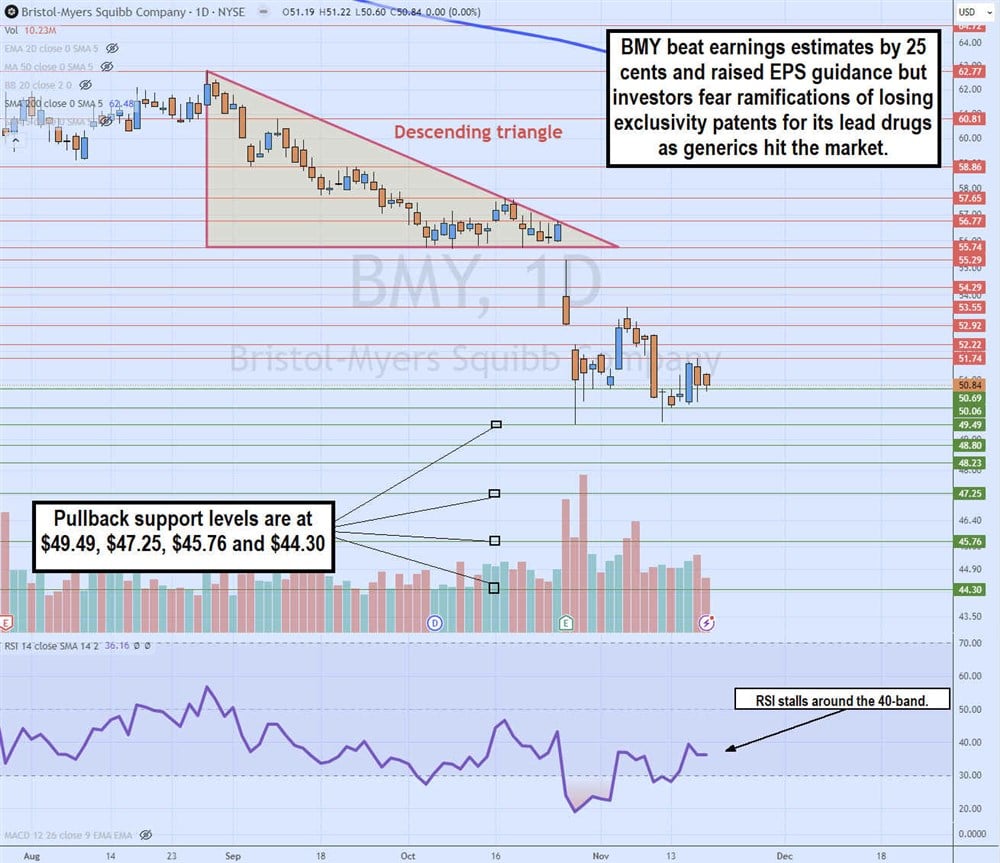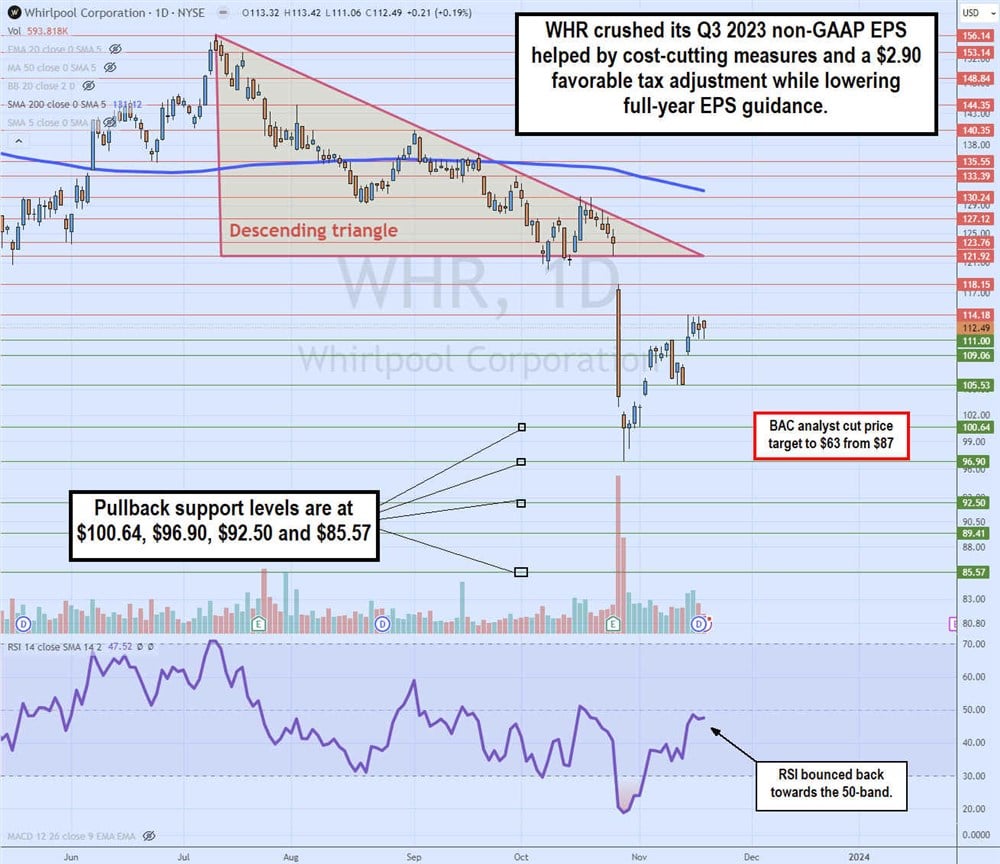
As the third quarter 2023 earnings season ends, it's worth looking back to see which stocks may have been overlooked or mispriced on their results. Regardless of sector or industry, every earnings season has its share of misfits and heroes. Some stocks overperformed and were rewarded with surging price gains, and those underperforming were punished with double-digit haircuts. Then, there are those peculiar cases where stocks underperformed and were rewarded with higher prices. This brings us to stocks that overperformed but ended up trading lower as investors focused on future material impacts.
Here are two stocks that crushed their earnings estimates but reacted by selling off. These two stocks both pay outsized dividends and trade at single-digit forward P/Es. They just might be an opportunity for investors looking for value as long as the future risks are understood.
Bristol-Myers Squibb Inc. (NYSE: BMY)
As a global biopharmaceutical company, Bristol-Myers is the classic "big pharma" definition with a $103 billion market cap. They develop and manufacture drugs to treat cardiovascular diseases, immunology, central nervous system disorders and cancer. Its top-selling blockbuster cancer drugs, Revlimid and Opdivo, and Eliquis, a blood thinner co-owned by Pfizer Inc. (NYSE: PFE), generate more than 60% of its total revenues. While the company has a strong pipeline of treatments, including its newly approved in November 2023 lung cancer drug repotrectinib, it faces tough competition from generics, which is a key focus of investors concerned about Bristol-Myers' moat.
Attack of the generics
Bristol-Myers' top three drugs all have competition from the generic drug makers. Its top seller, Revlimid, has several generic versions that sell for up to 85% cheaper. Revlimid, technically called lenalidomide, has been used to treat multiple myeloma and myelodysplastic syndromes (MDS) since its FDA approval in 2007. It was originally patented by Celgene, which Bristol-Myers acquired in 2019.\
The exclusivity patent expired in 2022, causing new generics to flood the market by various pharmaceuticals ranging from Teva Pharmaceutical Industries Ltd (NASDAQ: TEVA) in the U.S. and Novartis AG (NYSE: NVS) selling its version in Canada and Europe. Several smaller companies, including Dr. Reddy's Laboratories Ltd (NYSE: RDY), launched their generic versions. The average wholesale price of Revlimid's 28-day supply for 2.5 mg is $24,576. Compare that to the generic version, costing around $3,000 for a 28-day monthly supply. While Bristol-Myers has made limited licensing agreements with some generic companies, the supply of new generic versions will run rampant from 2026. Eliquis, Yervoy and Pomalyst patents lose their exclusivity in 2026. The patent for Opdivo expires in 2028.\
EPS continues to grow when revenues decelerate
Bristol-Myers reported Q3 2023 EPS of $2.00, beating consensus analyst estimates of $1.76 by 24 cents. Revenues fell 2.2% YoY to $10.97 billion, beating $10.96 billion analyst estimates.
Raising the EPS bar
Bristol-Myers raised its full-year 2023 EPS to $75.0 to $7.65, from earlier forecasts of $7.35 to $7.65, versus $7.36 consensus analyst estimates. Full-year 2023 revenues are expected to be down by low single digits.
Bristol-Myers Squibb CEO Dr. Giovanni Caforio commented, “My excitement for the company's future is centered on the diversification of our business, the breadth of our new product portfolio and the strength of our pipeline." He continued, "I am proud of what we have achieved together and look forward to what the dedicated people of our company will continue to accomplish for patients."
Analyst actions
Several analysts downgraded shares of BMY after its earnings release. On October 27, 2023, Will Blair cut BMY ratings to Market Perform. BMO Capital Markets cut BMY to a Market Perform from Outperform with a $60 price target. HSBC Securities raised to a Hold with a $54 price target. On November 2, 2023, Daiwa Securities cut BMY to a Neutral, shedding its price target to $54 from $68. Deutsche Bank cut its rating to a Hold with a $54 price target, and Cantor Fitzgerald cut its rating to Neutral with a $55 price target.
Bristol-Myers Squibb analyst ratings and price targets are at MarketBeat. Bristol-Myers Squibb peers and competitor stocks can be found with the MarketBeat stock screener.

Descending triangle breakdown
The daily candlestick chart on BMY illustrates the descending triangle breakdown triggered by its Q3 2023 earnings report. The descending trendline commenced at the $62.77 peak on August 29, 2023, as shares made lower highs on bounces, steadily falling lower. The flat-bottom horizontal trendline formed at $55.74 as it tested six times before the earnings release. Shares gapped down and collapsed to a low of $49.49 after its earnings release, sending the daily relative strength index (RSI) below the oversold 30-band to the 19-band before it bounced back above the 30-band on its bounce to the $53.55 peak.
Whirlpool Co. (NYSE: WHR)
Home appliance manufacturer Whirlpool makes, distributes and sells its portfolio of major household appliances ranging from washers, dryers, refrigerators, cook tops and ovens. It also sells small applications like toasters and blenders. The company experienced a massive surge during the post-pandemic reopening phase in 2021, pumping its annual EPS to nearly $26, followed by normalization in the following years, cutting its annual EPS to $16 in 2023. Rising interest rates leading to a slowdown in home purchases and an uncertain macroeconomic climate have led to continued normalization. Its long-term debt is nearly equivalent to its $6.2 billion market cap. Soaring interest rates have made debt financing expensive as investors fear a potential dividend cut in this high-rate environment. The company has been trying to divest its EMEA business, which is expected to close in April 2024, unlocking 150 bps or margin expansion and boosting annual cash flow by $250 million.
Strong non-GAAP EPS beat
Whirlpool reported non-GAAP EPS of $5.45, beating consensus analyst estimates of $4.27 by $1.18. GAAP earnings were $1.53 per share. GAAP net earnings margin fell 130 bps to 1.7%. Revenues grew 2.8% YoY to $4.93 billion, beating analyst estimates of $4.79 billion. Cost take-out actions and cost reductions delivered $300 million in YoY savings in the quarter and is on track to deliver $800 million in annual savings in 2023. The company is expected to return $400 million in dividends to shareholders in 2023.
Mixed guidance
Whirlpool offered mixed forward guidance, primarily responsible for the 20% stock price collapse to three-year lows. The company expects full-year 2023 EPS of around $16.00 per share versus $16.16 consensus analyst estimates. This is down from prior estimates of $16.00 to $18.00. Full-year revenues are expected between $19.4 billion to $19.5 billion versus $19.15 billion. The company declared its fourth-quarter dividend of $1.75 per share.
CEO downplays the earnings beat
Whirlpool CEO Marc Bitzer commented, "We continue to deliver on our operational priorities with a 100 basis point year-over-year ongoing margin expansion and over a point of share gains in North America." The demand was driven largely by consumers replacing home appliances. Bitzer noted that demand discretionary purchases have been weaker than expected due to rising mortgage rates and weak consumer sentiment. He downplayed expectations, "Looking into the fourth quarter, we do not anticipate this environment to change fundamentally, and we do expect our business to perform on a similar level as Q3."
Bank of America decapitates WHR price target
Elizabeth Suzuki reiterated her Underperform rating on Whirlpool with a $63 price target, down from $87 per share, down nearly 50% from its closing price. His concern was the looming 2024 and 2025 debt paydown that will pressure its balance sheet to drop below the hospital cash balance of $1 billion, requiring new debt raise at unfavorable rates.
She also threw water on the EPS beat, "WHR's 3Q23 earnings results continued the company's pattern of missing expectations on EBIT while reporting a bottom-line beat to due non-GAAP adjustments, including $2.90 of favorable tax adjustments."
Whirlpool analyst ratings and price targets are at MarketBeat.

Daily descending triangle breakdown
The daily candlestick chart for WHR illustrates a classic descending triangle breakdown. The descending trendline formed at the $156.14 peak on July 12, 2023, deflecting every bounce attempt at lower prices. The flat-bottom trendline formed at $121.92. The Q3 2023 earnings release triggered the breakdown as shares gapped below the flat-bottom trendline support on their way to multi-year lows at $96.90. The daily RSI collapsed to the 18-band before snapping back on the dead cat bounce back to $114.18.














